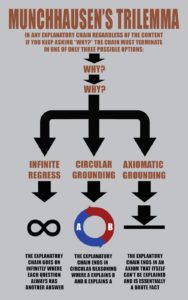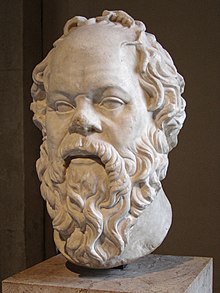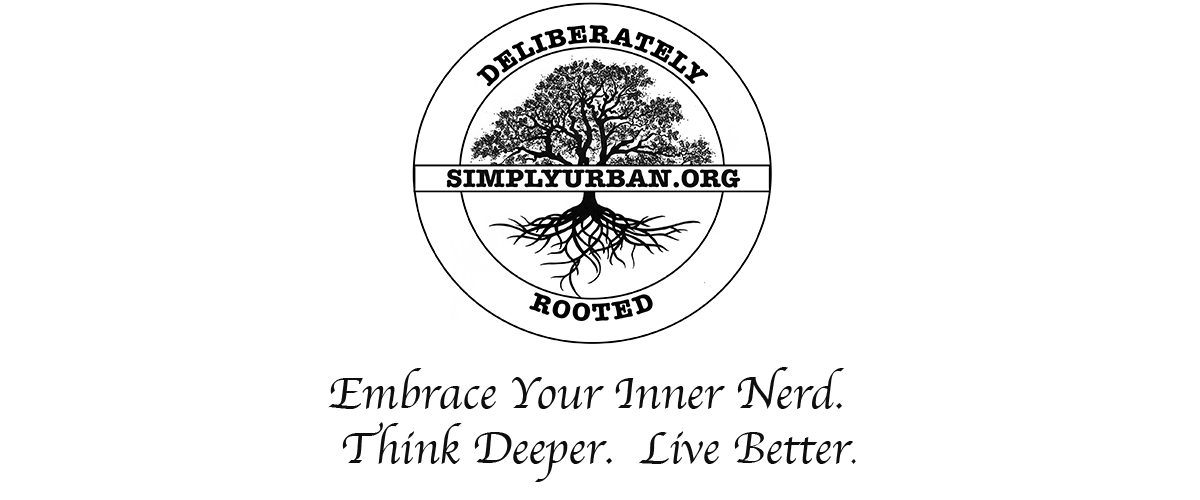Plato’s Republic tops the canon of philosophy. It covers justice, how we ought to live, and how to organize our society. In fact, most Western Democracies are Democratic Republics, ironically a form of government which Plato and Socrates would abhor. Plato’s thought covers so much that many say all knowledge is a footnote to Plato.
I think the most important part of Plato’s Republic deals with its treatment of the limitations of human knowledge and how we understand the world. Let me illustrate this with an example. Remember when you were a teenager, and you had the whole world figured out? Then, as you got older and wiser, it was like a record scratching across your childish views of life?
Well, that doesn’t stop. Getting older makes me more humble about the world’s complexity and our limited ability to understand it. Socrates best quote in Plato’s Republic was:
True knowledge is knowing that you know nothing.
Knowledge
All the knowledge in the universe dwarfs the small amount that we can fit into our brain in the span of one lifetime. Given this fact, the primary thought pattern shouldn’t be considering what we know but instead recognizing how much we don’t know. The primary thought pattern should be wrestling with uncertainties or holes in our knowledge.
One of the major themes of my blog is exploring the limits of our knowledge.
This essay is the third in my series of commentaries on Plato’s Dialogues. You can read the first, BREAKING: Socrates Executed for Hate Speech, here. If you’re looking for love, check out The Philosophy of Love: Plato’s Symposium. If you’re wondering why I write essays like this, read about my blog here.

Munchausen’s Trilemma Infographic
Descent into Darkness
Plato’s Republic explores this idea via the analogy of a cave. Imagine you spent your whole life in a cave. You were tied up in such a way that you could only see the back of the cave. Behind you, a big fire cast shadows of everything happening behind you onto the wall at the back of the cave, the only thing you can see.
Now imagine a bridge behind you where people, monkeys, horses, etc., walked. But, all you could see were the shadows projected onto the wall in front of you. The truth would be nothing but shadows for these cave people.
Plato’s Republic compares the quest for knowledge to breaking the chains and leaving the cave.
At first, when any of them is liberated and compelled suddenly to stand up and turn his neck round and walk and look toward the light, he will suffer sharp pains; the glare will distress him, and he will be unable to see the realities of which in his former state he had [only] seen the shadows; and then conceive someone saying to him, that what he saw before was an illusion, but that now, when he is approaching nearer to being and his eye is turned toward more real existence, he has a clearer vision—what will be his reply? … Will he not fancy that the shadows which he formerly saw are truer than the objects which are now shown to him?
Plato. Six Great Dialogues: Apology, Crito, Phaedo, Phaedrus, Symposium, The Republic (Dover Thrift Editions) (pp. 360-361). Dover Publications. Kindle Edition.
How We Think
Plato believed education the key to becoming enlightened. He compared leaving ignorance to the idea of leaving the cave behind, that is, becoming educated. Ray Dalio describes this idea as radical truth and transparency. Although education is helpful, we suffer under severe limitations. For instance, we can only see light in a particular spectrum, only hear sounds in a limited band, and our life span limits the amount of knowledge we can acquire, etc.
I used to believe humans process information rationally and optimize decisions based on the best available information. But, I couldn’t have been more wrong. As Benjamin Franklin said:
“What reasonable creatures humans are, they can find a reason for whatever they want to do.” (I paraphrased that a bit).
Worship of Science
Many people today worship the religion of science. But, it is a flawed and capricious god. Science says little that’s applicable to the human condition or how we should live. A commandment to ‘E = MC^2 makes no sense.
Rationality represents our best tool to understand some aspects of the world, but it’s far from perfect. Plato explains how we build theories or hypotheses about the world as a contrivance to aid our thinking about reality, yet these aren’t a completely accurate representation.
You are aware that students of geometry, arithmetic, and the kindred sciences assume the odd and the even and the figures and three kinds of angles, and the like in their several branches of science; these are their hypotheses, which they and everybody are supposed to know, and therefore they do not deign to give any account of them either to themselves or others; but they begin with them, and go on until they arrive at last, and in a consistent manner, at their conclusion? … they are thinking [not about concrete reality], but of the ideals which they resemble; …, which can only be seen with the eye of the mind?

Portrait of Socrates. Marble, Roman artwork (1st century), perhaps a copy of a lost bronze statue made by Lysippos
Plato. Six Great Dialogues: Apology, Crito, Phaedo, Phaedrus, Symposium, The Republic (Dover Thrift Editions) (pp. 358-359). Dover Publications. Kindle Edition.
Our brains don’t understand reality completely and thoroughly. We take short cuts that can lead to bad judgments. One of the most popular is in The Empathy Trap.
Cognitive Bias
Remember when I said that all knowledge is a footnote to Plato? It always fascinates me when scientists win Nobel Prizes proving what philosophers knew thousands of years ago. Well, Daniel Kahneman and Amos Tversky’s work on Cognitive Bias won them a Nobel Prize by extending and formalizing this bit of thinking from Plato’s Republic. Wikipedia describes Cognitive Bias as:
a systematic pattern of deviation from norm or rationality in judgment.Individuals create their own “subjective social reality” from their perception of the input. An individual’s construction of social reality, not the objective input, may dictate their behaviour in the social world. Thus, cognitive biases may sometimes lead to perceptual distortion, inaccurate judgment, illogical interpretation, or what is broadly called irrationality.
People like to believe they see the world objectively and build a rational, scientific view of reality. But we don’t. Our brains have evolved glitches that kill rational thought. Confirmation bias, tribalism, and emotions, especially fear, short circuit logical thinking. Rational thought requires education and a commitment to understanding objective reality. Both seem like they’re fading in our culture. Truth itself is falling out of favor, as I explain in The Post Truth Era.
Thoughts Create Reality
Everyone’s heard the cliche that ‘your thoughts create your reality.’ But, that’s more true than many people realize. In physics, the act of measuring particles interferes with them and distorts the measurement to an extent. So, in a way, a scientist’s thought to study something distorts that which he studies. Economists like to believe that market participants act rationally, making good decisions based on hard data like earnings and intrinsic value. But, anyone who’s followed the GameStop fiasco knows that isn’t true.
CNBC summarizes the Gamestop fiasco saying:
Majorly simplified: Everyman retail investors are using Reddit to spread the word and help boost the stock price of video game retailer GameStop (as well as some others) … Joost van Dreunen, who teaches the business of video games at the NYU Stern School of Business [said].
“It has nothing to do with the fundamentals of the actual GameStop company, they’re just playing the financial metagame.” …
The narrative many are promoting about the GameStop frenzy is that small retail investors are sticking it to “big evil Wall Street,” says Kelly Shue, professor of finance at the Yale School of Management.
Though that’s not what is actually happening, the story is applealing because there is a lot of pent up anger and frustration around the power structure that the financial industry perpetuates, says Sarah Newcomb, director of behavioral science at investment research firm Morningstar.
Some users of WallStreetBets (the subreddit community that helped trigger the GameStop surge) describe the pain that they and their families endured during the 2008 financial crisis and highlight how professional investors were never punished, Shue says.
“It hasn’t really escaped anyone that over the last decade or so, there’s been this persistent favoritism towards large institutions at the expense of everyone else,” van Dreunen says.
Tangled Web
In conclusion, the metaphor of the cave in Plato’s Republic highlights that our understanding of the world is all tangled up due to our limited knowledge and distortions wrapped up with being human. We struggle with many limitations, from limited sense organs (only being able to see particular light, hear certain sounds, etc.) to our emotions distorting how we understand and interact with the world around us. So, our destiny isn’t determined by what we know. It’s shaped more by how we deal with the things we don’t know. Or, as Ray Dalio puts it:
Sincerely believe that you might not know the best possible path and recognize that your ability to deal well with “not knowing” is more important than whatever it is you do know.
Dalio, Ray. Principles: Life and Work (p. 188). Simon & Schuster. Kindle Edition.
What do you think?
Thanks for reading to the end! This blog is my project in the pursuit of truth. I spend dozens of hours researching each blog post, so I hope you found something useful.
Our click-bait culture needs good ideas in an increasingly complex world. That depends on good men and women engaging in intellectually honest discussions, sharing ideas, and challenging each other’s thinking. Writing out my thoughts in detail, along with lots of research, helps me arrive at a more accurate view of truth based on well-documented facts.
If you’d like to support my blog please buy my book. Here’s the link!





Leave a Reply
Your email is safe with us.